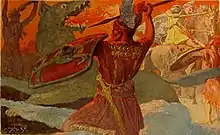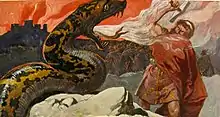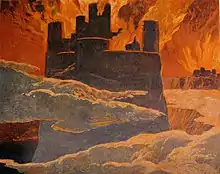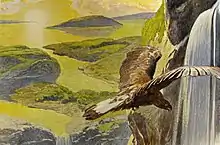Ragnarök
In Norse mythology, Ragnarök which in Old Norse translates to "Doom of the Gods" is the battle at the end of the world. It is to be fought between the gods or Æsir, led by Odin; and the fire giants, the Jötnar and other monsters, led by Loki and Surtr. Not only will most of the gods, giants, and monsters die in this battle, but almost everything in the universe will be destroyed.




The following battles will be fought:
- Odin vs Fenrir: Odin will be swallowed by Fenrir.
- Vidar vs Fenrir: Vidar will kill Fenrir by stepping on the jaw of Fenrir (also known as Fenris) and split it all the way down through his tail. That's when Ragnarok ends.
- Thor vs Jormungandr: Thor kills Jormungandr, but then dies from his wounds and the poison after taking nine steps.
- Tyr vs Garm: Garm bites off Tyr's other hand and he bleeds out, but not before he gives Garm a mortal wound, which does kill him.
- Heimdall vs Loki: Both will inflict fatal wounds on each other, but Loki shall refuse to die until he sees the destruction of the worlds which will happen soon after. They'll both die next to each other.
After these gods die, Surtr will alight the world in flames, until a flood finally covers the world.
Surviving gods
Hoenir, Magni, Modi, Njord, Vidar, Vali, and the daughter of Sol are all stated to survive Ragnarok. All of the remaining Æsir then reunite at Ithavllir. Baldr and Hod return from the underworld - Baldr having been killed by Hod, and Hod by Vali, before Ragnarok. Hoenir either makes slots for divination or receives a wand for divination, depending on the translation. Vidar - who avenges Odin - and Vali are unharmed by Surtr's fire or the flood. Magni and Modi who will wield their father's (Thor) hammer, Mjolnir, will also live. Njord is stated to return to Vanaheim at "the doom of man", which has been interpreted as Ragnarok. Sol (who dies) gives birth to a daughter who will follow her path in the new world.[1]
Theories
There are some beings whose fate after Ragnarok is uncertain. Nidhhoggr is stated to fly with darkness under him and corpses on his back at the end of the Voluspa. This has been noted to not fit well with the theme of the last stanza, in which all of the old and bad has been burnt, and a new world with only good will rise of the waters. The last stanza has seen this interpreted differently, with some having Nidhoggr as the last remaining evil in the new world, and others stating that Nidhhoggr will rise one more time but then fall back to the ground, meaning evil has been defeated and all is good in the new world.
Additionally, the dwarfs are stated to be in their "stone doors". This has been interpreted as meaning that the dwarfs are stuck in their mountain homes or structures, which are going to fall - but that they are unable to leave, as they will turn to stone if they do.
References
- Snorri Sturluson in his Prose Edda spelled it Ragnarøkr (sometimes "Ragnarøkkr") which means "Twilight of the Gods," whence the German title of Wagner's work "Götterdämmerung."
2. The Voluspa in the Poetic Edda